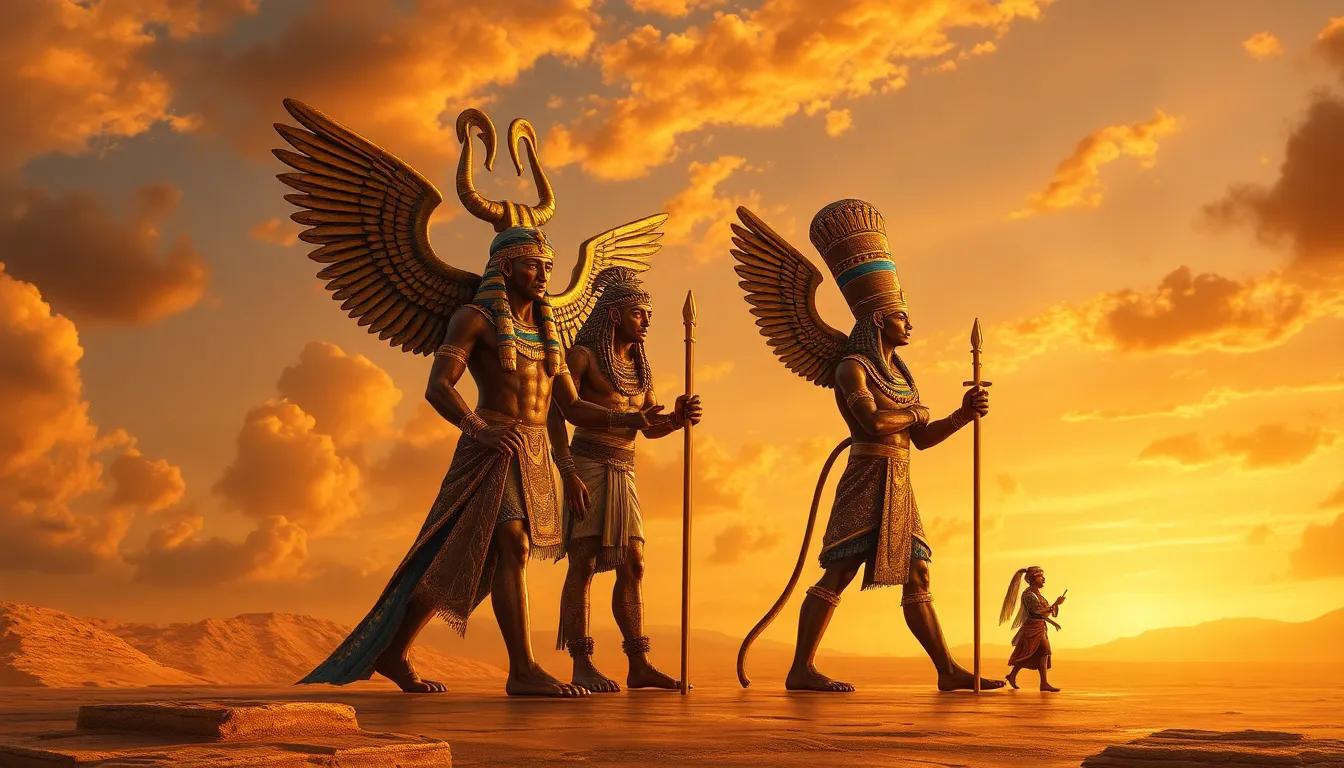The Role of the Gods in Egyptian Creation Narratives
I. Introduction
Egyptian mythology is a rich tapestry of gods, goddesses, and creation stories that have shaped the cultural and spiritual landscape of ancient Egypt. These narratives offer insight into how the ancient Egyptians understood the universe, the origins of life, and their place within the cosmic order.
Creation narratives hold a particularly important role in ancient Egyptian culture, as they not only explain the origins of the world and its inhabitants but also illustrate the values and beliefs that governed society. This article delves into the role of the gods in Egyptian creation myths, exploring their significance and the various narratives that emerged throughout Egypt’s history.
II. The Concept of Creation in Ancient Egypt
Creation narratives in ancient Egypt are stories that describe how the universe and its inhabitants came into being. These myths are deeply intertwined with the concept of Maat, which represents truth, balance, and cosmic order. The ancient Egyptians believed that maintaining Maat was essential for the stability of the universe.
The cyclical nature of creation and rebirth is a recurring theme in these narratives. The Egyptians viewed the cosmos as a dynamic entity, constantly undergoing cycles of creation, destruction, and renewal, reflecting the natural cycles observed in the world around them.
III. Key Deities in Egyptian Creation Myths
Several deities are central to Egyptian creation myths, each embodying different aspects of the creative process:
- Atum: The self-creating god who emerged from the primordial waters of chaos, Atum is often depicted as the first god who created himself and subsequently birthed other deities.
- Ptah: Known as the craftsman of the universe, Ptah created the world through thought and speech, bringing order to chaos with his divine intellect.
- Amun: As the hidden one, Amun’s role in creation emphasizes the mysterious and unseen forces that shape the world, highlighting the importance of hidden aspects of existence.
IV. Different Creation Myths in Egyptian Tradition
Egyptian tradition is marked by various creation myths, each presenting a unique perspective on the origins of the world:
A. The Heliopolitan Creation Myth
This myth originates from Heliopolis and centers around Atum:
- Origin of the sun god Atum: Atum emerged from the chaotic waters of Nun, representing the beginning of creation.
- Emergence of the other gods: From Atum, other gods such as Shu (air) and Tefnut (moisture) were born, setting the stage for the creation of the world and its inhabitants.
B. The Memphite Creation Myth
Prominent in Memphis, this myth highlights Ptah’s role:
- Ptah’s role as the creator: Ptah created the world through his heart and speech, conceptualizing it in his mind and then speaking it into existence, illustrating the power of thought and language.
C. The Theban Creation Myth
This myth emphasizes Amun’s hidden nature:
- Amun’s influence: Amun, as the hidden one, represents the unseen forces of creation, suggesting that the most profound aspects of existence are often beyond human comprehension.
V. The Relationship Between Gods and Humanity
In Egyptian mythology, the creation of humans is intricately linked to the gods:
- Creation of humans: Humans were often seen as the children of the gods, created to serve and worship them, thus fulfilling a divine purpose.
- The purpose of human existence: Human life was believed to be a reflection of divine will, with the responsibility to maintain Maat and honor the gods.
- Myths illustrating human creation: One notable figure is Khnum, who is depicted as shaping humans from clay on a potter’s wheel.
VI. Symbolism and Themes in Creation Narratives
Creation narratives are rich in symbolism and themes that resonate throughout Egyptian culture:
- Themes of chaos and order: Many myths begin with chaos (Nun) and illustrate the process of bringing order to this chaos through divine action.
- The symbolism of water: Water is often depicted as the primordial state from which life emerges, symbolizing potential and fertility.
- The significance of time and cycles: Time in Egyptian thought is cyclical, with creation narratives reflecting the belief in eternal recurrence and renewal.
VII. The Influence of Creation Myths on Egyptian Society
The impact of creation myths extended far beyond theology, shaping various aspects of Egyptian society:
- Religious practices: Creation narratives informed rituals and ceremonies aimed at honoring the gods and maintaining Maat.
- Art, literature, and architecture: These myths inspired countless works of art and literature, as well as monumental architecture like temples and pyramids, which served as tributes to the gods.
- Pharaonic legitimacy: Pharaohs often used creation myths to legitimize their rule, claiming divine ancestry and the responsibility to uphold Maat.
VIII. Conclusion
In conclusion, the gods of ancient Egypt play a pivotal role in the creation narratives that illuminate the civilization’s understanding of existence. These myths are not just stories; they encapsulate the values, beliefs, and worldview of the ancient Egyptians, revealing their profound connection to the divine.
The legacy of these creation myths continues to influence modern culture, reminding us of the timeless human quest to understand the origins of life and our place in the cosmos. Through the exploration of these narratives, we gain invaluable insight into the ancient Egyptian worldview, which remains a source of fascination and inspiration to this day.




